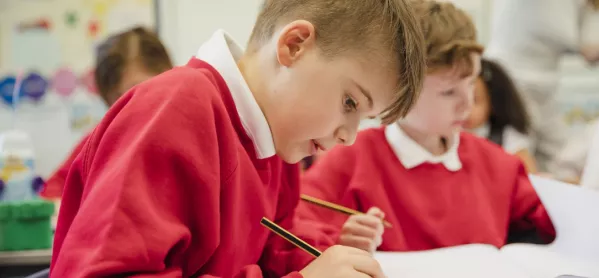Covid: Poorer pupils extra month behind in maths

Disadvantaged primary school pupils have fallen a month further behind their peers in maths since the Covid pandemic took hold, a new report from the Education Endowment Foundation (EEF) reveals.
The research says that from autumn 2019 to summer 2021 there was an increase in the maths disadvantage gap between “FSM6” pupils - those who have been eligible for free school meals in the past six years - and their peers of between 4 and 17 per cent.
The report’s authors say that their best estimates suggest that this is equal to around one month’s progress in the subject.
But despite the widening maths attainment gap, the report, entitled Covid-19 disruptions: attainment gaps and primary school responses, says there was “no discernible change in the disadvantage gap for reading”.
- GCSEs: ‘Decade of failure’ on closing the attainment gap
- Disadvantage: Why doubling PPA could help tackle the attainment gap
- Attainment: Rise in FSM pupils ‘will distort attainment data’
It also says that researchers did not find that approaches taken by schools - such as providing extra teaching time or reducing the curriculum - helped to close the disadvantage gaps.
The research, carried out by the EEF alongside FFT Education Datalab and TeacherTapp, generally confirms findings that were published in an interim report by the organisations last May.
Covid: The disadvantage gap has widened in maths
The updated study shows that most of the widening of the disadvantage gap happened during the initial lockdown, which started in March 2020. Estimates based on the most recent data suggest there may even have been a slight recovery during the summer term last year.
The basis for the research was assessments taken by 19,000 primary-aged pupils (aged 5 to 11) from 117 English primary schools, with these assessments being taken in September 2020, towards the end of the autumn term 2020, during the spring term 2021, and then again in the summer term 2021.
Professor Becky Francis, chief executive of the EEF, said the research shows what the organisation expected “but hoped not to be true”.
She added: “The pandemic has left children and young people from disadvantaged backgrounds worse off. Teachers have been working to close the attainment gap since long before the onset of Covid-19 and they know progress to close it is hard-won.
“It is essential that we continue to work as a collective, providing teachers with the resources they need to deliver long-term, sustained support for the disadvantaged pupils in their care.”
Commenting on the report, James Turner, CEO of educational charity The Sutton Trust, said the research shows that the pandemic has driven a wedge between the educational outcomes of disadvantaged schoolchildren and their classmates, and called for a “reboot” of the National Tutoring Programme - the government’s flagship catch-up programme - to combat this.
“The EEF’s own evidence shows that high-quality tutoring can lead to five months’ additional progress for children over a single year,” he said.
“The National Tutoring Programme was intended to democratise access to high-quality tutoring for the children who need it most, but it has encountered significant problems in delivery in Year 2.
“R-booting the NTP by focusing on quality and helping the poorest children remains one of the best bets in addressing the widening inequalities identified by the EEF’s research today.”
Paul Whiteman, general secretary of school leaders’ union the NAHT, echoed Mr Turner’s thoughts on the importance of the NTP.
He said: “It is essential that government supports schools with appropriate levels of recovery funding, particularly targeted at those that need it the most.
“Schemes such as national tutoring need to continue to be properly funded. It would be an enormous mistake for the government to assume they can simply hand this over to schools now.”
You need a Tes subscription to read this article
Subscribe now to read this article and get other subscriber-only content:
- Unlimited access to all Tes magazine content
- Exclusive subscriber-only stories
- Award-winning email newsletters
Already a subscriber? Log in
You need a subscription to read this article
Subscribe now to read this article and get other subscriber-only content, including:
- Unlimited access to all Tes magazine content
- Exclusive subscriber-only stories
- Award-winning email newsletters
topics in this article



